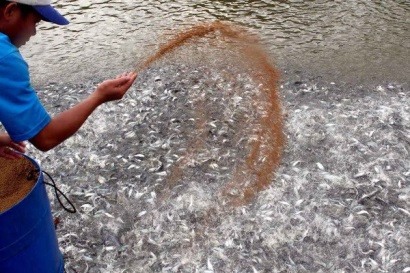 Economy
Economy

The tra fish industry needs to focus on intensive farming this year to increase efficiency and sustainable development.
 |
| Development of tra fish fingerling is one key factor in sustainable development of the tra fish industry in the future. - photo vasep.com.vn |
AN GIANG – The tra fish industry needs to focus on intensive farming this year to increase efficiency and sustainable development.
Minister of agriculture and rural development, Nguyễn Xuân Cường, spoke at a conference on implementing development plans for the tra fish industry this year held in An Giang February 18.
Cường said this year the industry strives to reach 1.51 million tonnes of tra fish output and export value of tra fish at about US$2.4 billion.
He said that localities should promote their advantages in producing tra fish and expand consumer markets in which enterprises play a key role.
Enterprises and local authorities need to review raw material areas, strict management of development plans for the areas, and encourage farmers to join production chains, Cường said. Joining production chains will help farmers ensure stable output while enterprises can control farming areas, output and quality of tra fish material to find the best market strategy.
To ensure sustainable development this year and beyond, he said localities, businesses and farmers need to comply with regulations relating to management of the tra fish industry, especially control of production facilities, traceability, food safety and environmental protection. Quality of fingerlings, fishery materials and products need to be controlled. The latest technologies need to be applied to the tra fish industry; of which, fingerlings are a key part of the tra fish production chain.
Vice chairman of the People’s Committee of An Giang Province, Trần Anh Thư said high-quality fingerlings are a decisive factor for sustainable development of the tra fish industry.
In the future, provinces in the Mekong River Delta need to form closed tra fish production lines from the stage of developing fingerlings to processing tra fish fillet for export, Thư said.
"Doing this will help businesses control the quality of tra fish products at all stages and easily apply scientific advances to production, reducing costs and increasing profits. Consumers can easily trace the products they use,” Thư said.
Doãn Tới, general director of Nam Việt Joint Stock Company, said at the conference that after a crisis, the tra fish industry has developed strongly over the past two years. Sometimes, the export price of tra fish fillet to the US market was up to US$5.6-7 per kg. With this trend, the price is likely to continue at a high level this year, benefiting farmers and exporters.
"To develop sustainably in the future, the industry should not open more tra fish processing factories. Localities should not expand farming areas and control production to avoid oversupply of tra fish. Meanwhile, enterprises need to focus on improving product quality, expanding markets and restoring traditional markets such as the EU and South America,” Tới said.
Party Committee Secretary of Đồng Tháp Province, Lê Minh Hoàn, said it is time for the business community to enhance their responsibility for the development of tra fish in the Mekong Delta region.
Businesses, associations and the tra fish industry need to publicise information about farming areas, production and market for the development of tra fish, he said.
According to Minister Cường, despite many difficulties in 2018, the price of tra fish stood at about VNĐ29,000 per kg, VNĐ4,000 higher than in 2017. Especially, in October 2018, the highest price was VNĐ35,000-36,000 per kg.
Thanks to the high price, the tra fish export value last year reached $2.26 billion.
Hi-tech for tra fish
Before the conference, Minister Cường and the ministry’s delegation visited some tra fish production and processing companies in An Giang and Đồng Tháp provinces on February 17.
Cường lauded the application of nanobubble aeration system and bakture powder catalyst to treat wastewater in tra fish breeding ponds in An Giang-based Nam Việt Joint Stock Company, which helps protect the environment while bringing more benefits to the farmers and contributing to the formation of complete value chain of the businesses.
Nam Việt has deployed the technologies over an area of 600 hectares in Châu Phú District to produce around 360 million high-quality tra-fish fingerlings and some 200,000 tonnes of tra fish for raw material.
As the project helps Nam Việt ensure sufficient supply of materials for processing by itself, the firm can gain a competitive edge over its competitors and higher yields from exports.
Minister Cường asked the company to continue expanding the project and ordered local authorities to facilitate the implementation of the project.
Meanwhile, Minister Cường also highly appreciated the Vĩnh Hoàn Joint Stock Company’s hi-tech project on producing fingerlings of tra fish in Vĩnh Hoà commune, Tân Châu Town, An Giang Province during his visit to this company. The 48ha project will produce 30 million fingerlings of tra fish.
In this project, the company uses genetic gene selection technology and biotechnology in water treatment as well as investment in modern infrastructure such as factories and aeration systems to have quality fingerlings and limitation of antibiotic use.
He emphasised that this project is implemented in time to solve key issues for the tra fish industry, including fingerlings, and to contribute to raising the value of tra fish.
The minister asked the company to promote the development of the project while the Ministry of Agriculture and Rural Development and other agencies are required to create favorable conditions for the development of the project.
Minister Cường also suggested local businesses invest heavily in intensive processing for high returns, and diversify foreign markets while paying more attention to the domestic one which boasts a population of nearly 100 million and tens of millions of international visitors each year. — VNS




